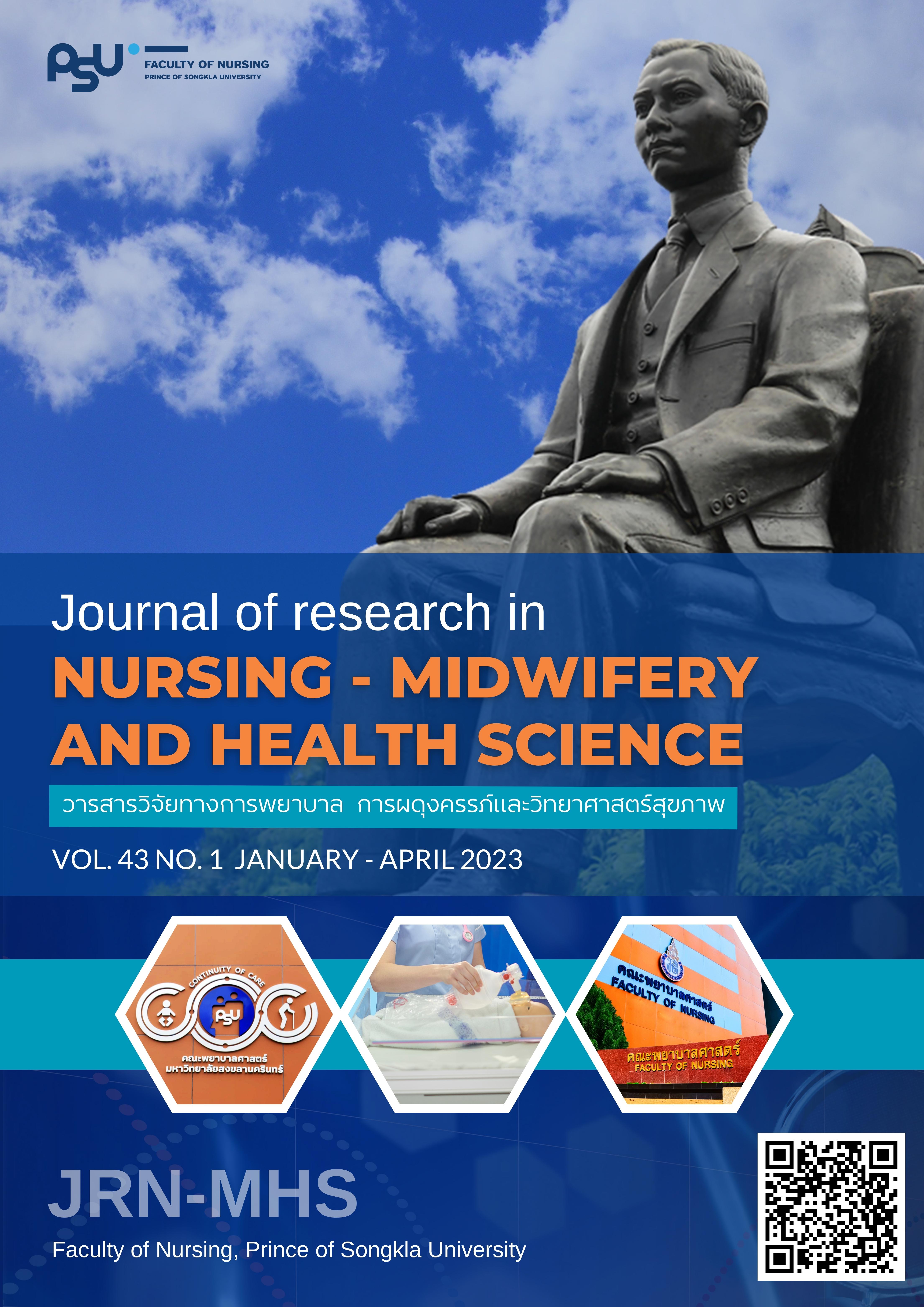ความต้องการการใช้เทคโนโลยีสารสนเทศเพื่อการเรียนรู้ตามความคิดเห็นของนักศึกษาพยาบาลวิทยาลัยพยาบาลในสังกัดคณะพยาบาลศาสตร์ สถาบันพระบรมราชชนก กระทรวงสาธารณสุข
Main Article Content
บทคัดย่อ
วัตถุประสงค์: การวิจัยครั้งนี้เป็นงานวิจัยเชิงคุณภาพ เพื่อศึกษาความต้องการการใช้เทคโนโลยีสารสนเทศเพื่อการเรียนรู้ตามความคิดเห็นของนักศึกษาพยาบาล วิทยาลัยพยาบาลในสังกัดคณะพยาบาลศาสตร์ สถาบันพระบรมราชชนก วิธีการ: ผู้ให้ข้อมูลหลักเลือกแบบเจาะจง (purposive sampling) จากนายกสโมสรนักศึกษา จำนวน 11 คน เก็บรวบรวมข้อมูลโดยการสัมภาษณ์เชิงลึกร่วมกับการบันทึกเทป ตรวจสอบความน่าเชื่อถือของข้อมูล โดยการตรวจสอบสามเส้าด้านข้อมูล ด้านการทบทวนข้อมูล การตรวจสอบยืนยันข้อมูลจากผู้ให้ข้อมูลหลัก และด้านวิธีการเก็บข้อมูล ข้อมูลที่ได้จากการสัมภาษณ์นำมาถอดความแบบคำต่อคำ และวิเคราะห์ข้อมูลตามวิธีของ Colaizzi ผลการศึกษา: พบว่า นักศึกษาได้สะท้อนมุมมองความต้องการการใช้เทคโนโลยีสารสนเทศในการเรียนรู้ตามความคิดเห็นของนักศึกษาพยาบาล 3 ประการหลัก ดังนี้ 1) ด้านเนื้อหาของหลักสูตรต้องทันสมัย 2) ด้านการวิธีจัดการเรียนการสอน ต้องปฏิบัติจริง และอิงเทคโนโลยี และ3) ด้านสิ่งสนับสนุนการเรียนรู้ ต้องใช้เทคโนโลยีล้ำสมัย คุณภาพดีและมีเพียงพอ สรุป: ผลจากการศึกษาดังกล่าวสามารถนำไปใช้เป็นข้อมูลในการวางแผนเพื่อการส่งเสริม พัฒนากำหนดยโยบายการใช้เทคโนโลยีในการจัดการเรียนรู้ในหลักสูตรพยาบาลศาสตรบัณฑิตได้อย่างมีประสิทธิภาพต่อไป
Article Details

อนุญาตภายใต้เงื่อนไข Creative Commons Attribution-NonCommercial-NoDerivatives 4.0 International License.
เอกสารอ้างอิง
Christensen CM, McDonald R, Altman EJ, et al. Disruptive innovation: An intellectual history and directions for future research. Journal of Management Studies. 2018; 55(7): 1043-78. doi: 10.1111/joms.12349.
Novak J, Purta M, Marciniak T, et al. The rise of digital challengers: How digitization can become the next growth engine for Central and Eastern Europe. New York: McKinsey; 2018.
Naipinit A, Kroeksakul P, Promsaka Na Sakolnakorn T. Adjustment under globalization. SKRU Academic Journal. 2014; 7(1): 1-12.
Liu JX, Goryakin Y, Maeda A, et al. Erratum to: Global health workforce labor market projections for 2030. Hum Resour Health. 2017; 15(1): 18. doi: 10.1186/s12960-017-0193-4.
World Health Organization. State of the world’s nursing 2020: Investing in education, jobs and leadership. World Health Organization: Geneva; 2020.
United Nations. General assembly resolution. Transforming our world, the 2030 agenda for sustainable development. New York: United States of America; 2015.
Nittayangkun S, Arabia N. Praboromarajchanok Institute annual report 2020. Nonthaburi: Phimphan Printing; 2020. Thai.
Kooariyakul A, Chidnayee S, Wuttijurepan A, et al. The evaluation of the bachelor of nursing curriculum revised edition 2012. BCNUT J Nurs. 2017; 9(1): 48-58 Thai.
Photaworn P, Boonnual C, Saiwaree T. An evaluation of the bachelor of nursing science program (revised curriculum B.E. 2559). SCNJ. 2022; 9(1): 199-212 Thai.
Weerawatthanodom N, Jadpum J, Jansook N, et al. An evaluation of bachelor of nursing curriculum (revised edition 2012) Boromarajonani College of Nursing, Chainat, in 2015. Chandrakasem Rajabhat University Journal of Graduate School. 2018; 13(2): 37-48. Thai.
Phalasri A. The relationship between literacy and acceptance of information technology and the information technology
use behaviors in the nursing practices of nursing students.J.H. Nsg Edu. 2021; 27(1): 43-57. Thai.
Thanomsing S. Praboromarajchanok Institute Strategic Plan Specialized higher education institutions under the Ministry of Public Health Year 2020-2024. Nonthaburi. Phimphan Printing; 2020. Thai.
International Council of Nurses. Leading nursing, past, present and future - ICN annual report 2019. Geneva: International Council of Nurses; 2020.
Colaizzi PF. Psychological research as the phenomenologist views it. In Ronald SV and Mark K, editors. Existentialphenomenological
alternatives for psychology. Oxford: Oxford University Press; 1978.
Thongmullek T, Vichitthamaros P. The study of factors affecting acceptance and use of social network of people in Thailand. JCOSCI. 2018; 5(2): 114-24 Thai.
Otieno JO, Nyambegera SM. Millennials and generation Z employees are here: Is your organization ready?. Journal of Language, Technology & Entrepreneurship in Africa. 2019; 10(2): 68-85.
McDermott JJ. The philosophy of John Dewey. Transactions of the Charles S Peirce Society. 1975; 11(3): 212-23.
Panich W. A way to create learning for students in the 21st century. Bangkok SodSri-Saritwong Foundation; 2012. Thai.
Office of the National Education Commission. National Education Act, B.E. 2542(1999) and amendment. Bangkok: Prigwhan Graphics; 2010. Thai.
Horn MB, Staker H. The rise of K-12 blended learning [internet]. [place unknown]: Innosight Institute; 2011 [cited 2021 Aug 11]. Available from: Available from: https://www.christenseninstitute.org/wp-content/uploads/2013/04/The-rise-of-K-12-blended-learning.pdf.
Glomjai T. Factors related to the effectiveness of simulation-based learning management in the professional nursing subjects category used by Boromarajonani College of Nursing, Phayao. JNHR. 2019; 20(2): 3-15 Thai.
Jeffries P. Simulation in nursing education: From conceptualization to evaluation. Philadelphia: Lippincott Williams & Wilkins; 2020.
Jintana A, Sunan L, Patchanee T. Future nursing educationinthe VUCA world changingfrom the 2019 Coronavirus pandemic situation. APHEIT Journal of Nursing and Health. 2022; 4(2): 1-11. Thai.
Deemee P, Lincharoen A. Development approach for assessment learning and innovation skills using assessment of learners method in 21st Century. JCDR-HS. 2017; 10(2): 139-53. Thai.
Kunaviktiku W. Teaching and learning in the discipline of nursing in the 21st Century. Nursing J. 2015; 42(2): 152-6. Thai.
National Innovation Agency (Public Organization), FutureTales lab. Future of learning. bangkok: Innovation foresight institute; 2022. Thai.
Raja R, Nagasubramani PC. Impact of modern technology in education. JAAR. 2018; 3(1Suppl): S33-5. doi: 10.21839/jaar.2018.v3iS1.165.
Thanaroj S. Simulation-based learning in principles and techniques course in nursing practicum. BCNUT J Nurs. 2019; 9(2): 70-84 Thai.
ASEAN University Network. The guide to AUN-QA as sessment at programme level version 4.0. Bangkok: Asean University Network; 2020. Thai.
Office of the Education Council Secretariat. National education Plan B.E. 2560-2579 (2017-2036). Bangkok: Pigwan Graphic; 2017. Thai.
Thailand Nursing and Midwifery Council. Certification criteria institute of nursing and midwifery 2019. Bangkok: Chut Thong; 2019. Thai.
Haraldseid C, Friberg F, Aase K. Nursing students’ perceptions of factors influencing their learning environment in a clinical skills laboratory: A qualitative study. Nurse Educ Today. 2015; 35(9): e1-6. doi: 10.1016/j.nedt.2015.03.015.
Higazee MZA, Rayan A, Ades MA, et al. Nursing students’satisfaction with their clinical experiences. IJNHS. 2017; 4(2): 16-21.


